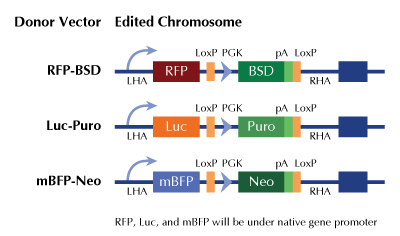CD44 Human Gene Knockout Kit (CRISPR)
CAT#: KN202455LP
CD44 - human gene knockout kit via CRISPR, HDR mediated
HDR-mediated knockout kit validation
CNY 12,260.00
CNY 3,710.00
CNY 1,999.00
CNY 2,700.00
CNY 8,152.00
Specifications
| Product Data | |
| Format | 2 gRNA vectors, 1 Luciferase-Puro donor, 1 scramble control |
| Donor DNA | Luciferase-Puro |
| Symbol | CD44 |
| Locus ID | 960 |
| Kit Components |
KN202455G1, CD44 gRNA vector 1 in pCas-Guide CRISPR vector KN202455G2, CD44 gRNA vector 2 in pCas-Guide CRISPR vector KN202455LP-D, donor DNA containing left and right homologous arms and Luciferase-Puro functional cassette. GE100003, scramble sequence in pCas-Guide vector |
| Disclaimer | These products are manufactured and supplied by OriGene under license from ERS. The kit is designed based on the best knowledge of CRISPR technology. The system has been functionally validated for knocking-in the cassette downstream the native promoter. The efficiency of the knock-out varies due to the nature of the biology and the complexity of the experimental process. |
| Reference Data | |
| RefSeq | NM_000610, NM_001001389, NM_001001390, NM_001001391, NM_001001392, NM_001202555, NM_001202556, NM_001202557 |
| Synonyms | CDW44; CSPG8; ECMR-III; HCELL; HUTCH-I; IN; LHR; MC56; MDU2; MDU3; MIC4; Pgp1 |
| Summary | The protein encoded by this gene is a cell-surface glycoprotein involved in cell-cell interactions, cell adhesion and migration. It is a receptor for hyaluronic acid (HA) and can also interact with other ligands, such as osteopontin, collagens, and matrix metalloproteinases (MMPs). This protein participates in a wide variety of cellular functions including lymphocyte activation, recirculation and homing, hematopoiesis, and tumor metastasis. Transcripts for this gene undergo complex alternative splicing that results in many functionally distinct isoforms, however, the full length nature of some of these variants has not been determined. Alternative splicing is the basis for the structural and functional diversity of this protein, and may be related to tumor metastasis. [provided by RefSeq, Jul 2008] |
Documents
| Product Manuals |
| FAQs |
Resources
| 基因表达相关资源 |
Other Versions
| SKU | Description | Size | Price |
|---|---|---|---|
| KN202455 | CD44 - human gene knockout kit via CRISPR, HDR mediated |
CNY 12,260.00 |
|
| KN202455BN | CD44 - human gene knockout kit via CRISPR, HDR mediated |
CNY 12,260.00 |
|
| KN202455RB | CD44 - human gene knockout kit via CRISPR, HDR mediated |
CNY 12,260.00 |
|
| KN402455 | CD44 - KN2.0, Human gene knockout kit via CRISPR, non-homology mediated. |
CNY 8,680.00 |
|
| GA100682 | CD44 CRISPRa kit - CRISPR gene activation of human CD44 molecule (Indian blood group) |
CNY 12,255.00 |


 United States
United States
 Germany
Germany
 Japan
Japan
 United Kingdom
United Kingdom
 China
China

